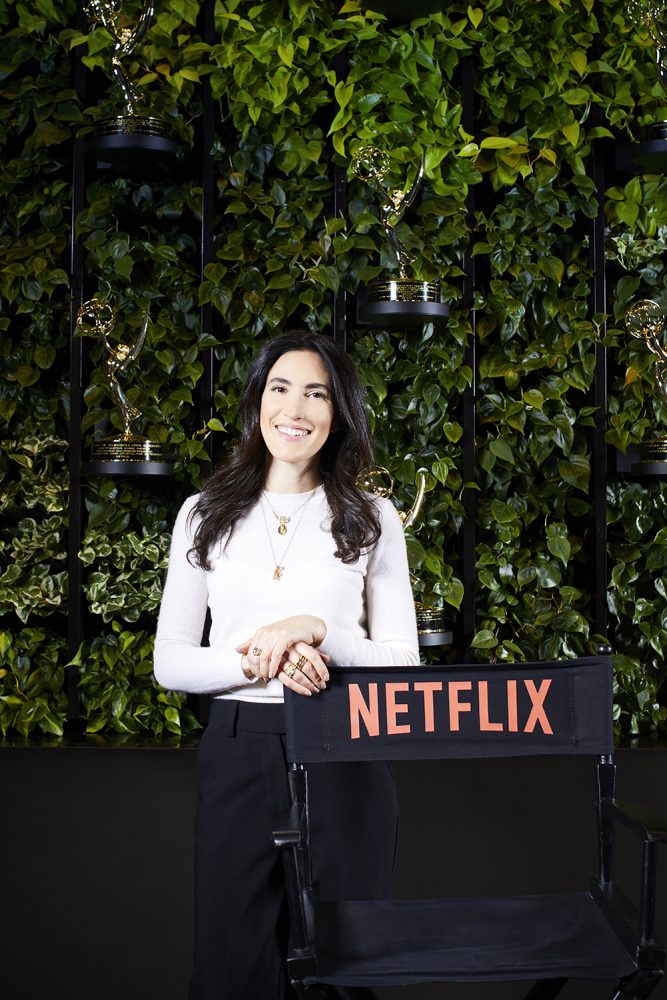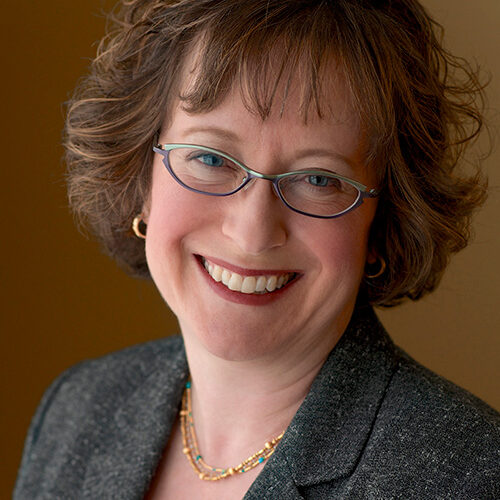Swimming Up Stream
Ray Wu ('92) and Sarah Collins ('13) bring popular streaming content to the masses at Lucasfilm Ltd. and Netflix.

Swimming Up Stream
Alumni make waves in the big business of streaming film and television.
Ray Wu (’92) works long hours because viewers want to stream The Mandalorian on their phones and in their home theaters. He spends hours in negotiations with talent because Star Wars fans are hungry for new installments.
That relentless demand for content—a craving that swung into overdrive during the pandemic, when audiences were stuck at home—keeps Wu focused on hammering out deals. He’s one of the attorneys who makes sure that Lucasfilm Ltd. has a stable of writers, directors, performers, showrunners, and producers to create live-action content for Disney+.
Streaming had already been gaining traction before the pandemic, as viewers began accessing content at all hours and on every device. The number of streaming subscriptions in the US leapt by 32 percent between 2019 and 2020, with 55 percent of adults reporting that they streamed more content during the pandemic in 2020, according to the Motion Picture Association. Netflix, Amazon, Hulu, and other companies ramped up their creation and distribution schedules, generating “high deal flow” conditions for Wu and other entertainment lawyers who negotiate the details of developing, producing, and distributing content.
more content
Wu, who joined Lucasfilm in 2021 as vice president, business affairs & legal counsel, estimates he shepherds a dozen deals at a time. He’s handled thousands of entertainment negotiations during his 20 years in the industry. Yet despite Hollywood’s reputation for indulging outsized egos, Wu is low-key and congenial. He’s also highly adaptable.

“Something always comes up, and it can be anything,” he says. “There’s always the best-laid plans—and then there’s what happens. Really being flexible is a key part of this job. It could be anything from where we’re going to shoot or when we’re going to shoot or how long.” Wu also oversees the legal aspects of production, “so if something comes up on set and there’s a question, I’m often the first point of contact for our producers. I can try to problem-solve or issue-spot those things.”
The public’s appetite for fresh content has largely ended the cyclical production schedule that used to drive network TV show pilots and summer film releases. “Now, people distribute content all times of year,” Wu says. “It’s not just spring or fall. Deal flow is constant. It’s not limited to the holiday weekends for a film [release]. So you have to build your deals differently.”
Take contracts for performers and producers of TV shows. In the past, these agreements typically included contingent compensation—usually a percentage of profits, plus additional bonuses for a show’s longevity. “You always looked at the back end, and there was a formula you worked with, and then you negotiated vigorously,” Wu says. “Now the back end is very different because we base things on different parameters.”
As streaming replaced a discrete TV season, the formula for assessing profitability had to change, too. “If we’re not giving you X percent of profits [at the end of a season], how are we going to replace that?” Wu says. “For example, would you give bonuses based on the number of [percentage] points you would have gotten before?”
Crafting and revising these terms is a team effort. “I have colleagues all around the company working in many different areas of the law, and they’re experts in their area,” Wu says. “I can lean on them and talk to them and get advice. Law is a very collaborative profession.”
There’s always the best-laid plans—and then there’s what happens. Really being flexible is a key part of this job. I’m often the first point of contact for our producers. I can try to problem-solve or issue-spot those things.
Before joining Lucasfilm, he was a partner at Business Affairs Inc. in Los Angeles, whose clients included Amazon and producers who made movies for Netflix, Apple, and other streaming services. He landed his first entertainment law role in 2000—a “dream job” for a theater lover—with Disney Theatrical Group. A dozen Disney movies, including The Lion King, Beauty and the Beast, and Aladdin, have been adapted for musical theater. He then spent a decade with Warner Bros. Entertainment, negotiating and structuring deals for its Theatre Ventures division.

Lucasfilm, launched by director and producer George Lucas, is renowned for its Star Wars and Indiana Jones series. It was acquired by Disney in 2012 and is a subsidiary of Walt Disney Studios. The company’s business and legal affairs team has about 20 members. The business affairs group negotiates all direct-to-consumer TV series distributed through Disney+, including talent agreements. The legal affairs group then drafts the agreements. Series such as The Mandalorian or Willow typically involve four negotiators and six legal affairs staffers, Wu says.
Although Wu plays a vital role in day-to-day business operations, he also thinks strategically, pondering how the language in contracts must evolve to reflect new technologies such as augmented reality and the metaverse. In the immersive online world of the metaverse, users can participate in virtual activities and events, buy and sell goods in a digital economy, and “exist” as avatars.
“You start with a very broad, open mind: This new possibility, what is it?” Wu says. “What are we dealing with, and how are we going to create content for that? And how are people going to view it? What is our goal in the deal-making process?
“That leads to a more narrowed approach of looking at our current deals, paperwork, and our agreements, and saying, ‘Does that cover it?’ And if it doesn’t, how do we need to change it? I could be changing everything or just adapting. More likely, I would say, it’s additive. You adapt your current documents to account for it.”
He notes that entertainment lawyers modified movie contracts in the 1980s to allow distribution on videocassettes and later, on DVDs. “It’s always an adaptation, and that’s a good analogy to law, right?” Wu says. “We’re hoping laws will stand and maybe be adapted to serve people better as things change and time changes. Same with agreements. I don’t think it’s necessary to always throw something out and start anew. It’s more of, see what you have and how do you adapt it to be more efficient.”
Wu’s work is often cerebral, but he occasionally bumps elbows with celebrities. He once had lunch with actor Bruce Willis, “but I can’t say I’m texting him every day.” During his theater days, he spent time with William Goldman, who wrote and adapted for the screen The Princess Bride and won Oscars for his screenplays of Butch Cassidy and the Sundance Kid and All the President’s Men. “I watched him work and felt blessed to be in a room with him,” Wu says.
Wu occasionally receives invitations to Hollywood events but never agonizes about being omitted from wrap parties or premieres. “I didn’t realize how hard it was to do an invite list until I got married,” he says. “So I told myself, I’ll never be insulted if I don’t get invited to a wedding. I look at it the same way with red-carpet events.”
Making Deals at the Nexus of Art and Law
If it weren’t for Netflix, Sarah Collins (’13) and millions of other viewers wouldn’t have become hooked on The Great British Baking Show. She and roughly 214 million subscribers turn to Netflix for content on demand—and Netflix turns to Collins for negotiating talent deals and drafting contracts for its original series.

She’s handled contract negotiations for When They See Us as well as Outer Banks and The Society, which was filmed in several Massachusetts towns including Lexington, Concord, and Lancaster. Netflix, which began as a DVD rental service, expanded to subscription-based video streaming in 2007. It’s the most popular video streaming brand in the US, accounting for 34 percent of streamed content, according to 2020 Nielsen data from 1,000 homes. Netflix fed that demand by amping up its offerings last year. It was prepared to debut a new movie every week in 2021 and had queued up more than 500 titles for release that year, according to the Wall Street Journal.
Collins says her work is an ideal blend of her legal training and her passion for the arts. “There’s no one path that takes you into entertainment,” she says, noting that some of her coworkers have backgrounds in litigation and corporate work. “The focus on being an excellent attorney is the common denominator I see in my colleagues.”
After studying English and art history at Georgetown University, she enrolled at BU Law, where she took classes in trademark law, contract drafting, and entertainment law. She helped found and lead the Art Law Society and was an extern at Volunteer Lawyers for the Arts in Boston.
When she’d gained transactional experience at a Boston firm, Collins moved to Los Angeles to seek work at the nexus of entertainment and law. She spent several years at Studio 8, which produced TV shows and feature films for theatrical release. She joined Netflix in 2017 and is a member of the company’s business and legal affairs team for dramas.
Her core task is negotiating deals for writers, producers, directors, and actors and overseeing business matters on multimillion-dollar productions. “There are so many people involved, including many who are working behind the cameras and behind the scenes, and if you can’t get these deals closed, they can’t do their jobs,” Collins says. “The closer you get to the start of production, the more people are being hired and the more money is on the line. If you aren’t able to close the actor deals, a production might be delayed, which can have significant financial impact.”
Despite that pressure, Collins sees negotiations as a collaborative process. “I come at things from an angle of building trust, not only with the talent we work with but also among other attorneys and executives. It’s not a huge industry, so we end up crossing paths frequently. Obviously, we work for parties that are at odds, but I view it as working toward a similar goal, which is ultimately getting content onto our service and helping our producers bring their visions to life on the screen.”
She’s especially enthusiastic about the surge of content available globally. Netflix provides content in more than 30 languages and 190 countries. “It gives us opportunities to hear voices on a scale that didn’t necessarily exist before,” Collins says. “These great stories can come from anywhere and be loved by people all over the world.”

